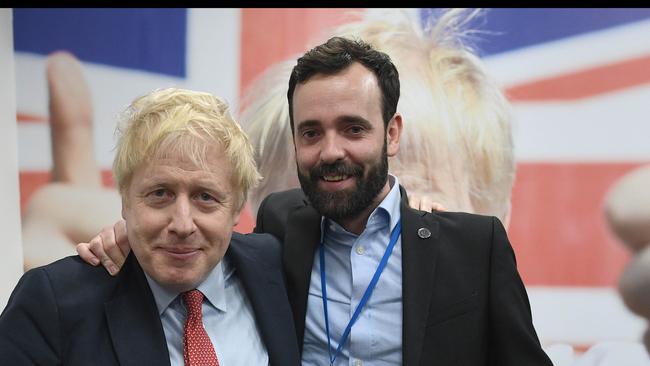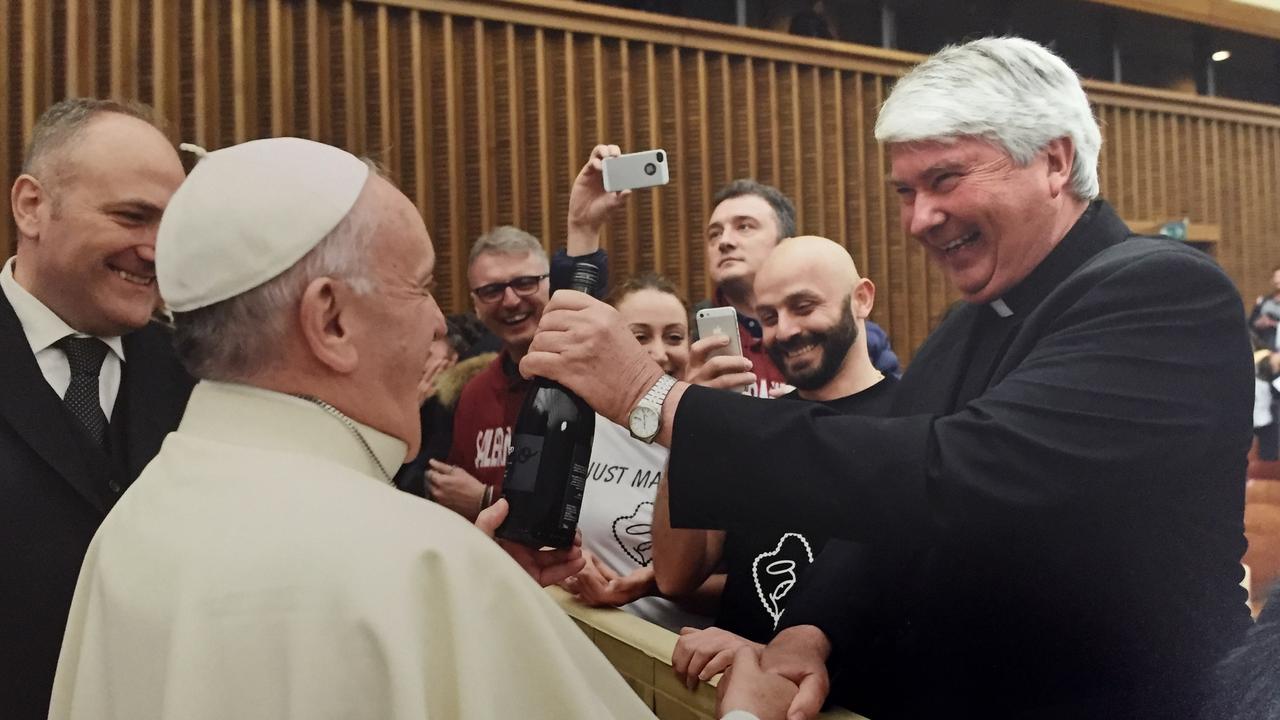Pulling the strings behind prime ministers’ re-elections
From the US to home in Australia and Britain, Isaac Levido has proven to be a campaign master.

It has been two months since the landslide victory of Boris Johnson and the Australian credited with guiding that triumph is in an envious position. Isaac Levido started last year working on the Scott Morrison campaign; by year’s end he had two general elections at either end of the world under his belt, with stunning victories in both.
With a hectic 12 months behind him, the 36-year-old political strategist who hails from Port Macquarie on NSW’s mid-north coast is pondering his next move.
Levido is in no hurry to decide as he conducts the final analysis of why and how Johnson’s thumping 80-seat majority came about. It was a staggering result that surpassed every single guess of the 150 staff members in the central campaign office.
Levido was cautiously optimistic on that December polling day but the result was always going to come down to turnout and whether traditional Labour supporters who voted to leave the EU — many of whom detested Labour leader Jeremy Corbyn — had been persuaded to give Johnson a chance.
Earlier this week The Weekend Australian met Levido at a central London hotel just around the corner from Conservative campaign headquarters, where he says he hasn’t formalised his future plans. No doubt there are offers; Levido has experience in various electoral theatres, the US as well as Australia and Britain.
He is friendly but firm. Occasionally glancing at his phone when it lights up a message, he insists that winging his way across the Atlantic to help on the Republican campaign is not an option.
It is not well known outside of political circles but Levido gained his campaigning expertise in the US working with the National Republican Senatorial Committee headquarters during the 2010 mid-term elections. This followed a masters in political science and earlier studies at the Australian National University.
“I wasn’t into student politics but rather interested in the mechanics of campaigns,’’ he says.
He was with the Republican senators for just under two years before switching to the Australian embassy for 18 months, where he became liaison between congress and then Australian ambassador to the US Kim Beazley, as well as an adviser on the 2012 US presidential election.
After working alongside Lynton Crosby in 2013 at his consulting firm Crosby Textor (known as CTF Partners in Britain) and helping the 2015 British general election won by David Cameron, the 2017 snap election called by Theresa May, who was returned with a minority government, and the failed 2016 London mayoral pitch of Zac Goldsmith, Levido headed back to the US to set up a CTF office in Washington, DC.
The timing would seem to suggest Levido is perfectly placed to advise on Donald Trump’s re-election strategy for the November presidential election, but when questioned he is categorical: “I’ve got no plans to go to America.”
Levido’s currency is sky high in Britain, where this week British GQ magazine named him one of the most influential people in the country. Described in its pages as “the sorcerer’s apprentice”, Levido is sandwiched between “the Duchess of Downing Street” (and partner of the Prime Minister), Carrie Symonds, and the “King of all He Surveys’’, Johnson.
It goes on: “An Australian walks into Conservative Party HQ. It’s not the beginning of a joke (yet). Rather, Levido, a relatively unknown Aussie strategist, was anointed by (Johnson’s chief of staff and) 4D chess master Dominic Cummings to run the Tory campaign in December. And look how he did!’’
Levido had been one of the deputy directors of the 2016 Liberal Party campaign under party federal director Andrew Hirst when he was approached to prepare and take charge of Johnson’s election plans, just days after the former London mayor was made Prime Minister in a run-off against Jeremy Hunt at the end of July last year.
He believes the Morrison win in May last year was in part because Labor had been preparing attacks against Malcolm Turnbull and his connections to the big end of town. “One of the reasons Bill Shorten lost was that Labor seemingly didn’t recalibrate its message when Scott Morrison became leader. That was complacent and lazy on their part,’’ he says.
The Conservatives had been watching the Australian polls with interest and Johnson knew Levido from the failed campaign to win the London mayoralty for close friend Goldsmith, as well as being convinced of his pedigree and abilities from great mate Crosby.
Levido hit the ground running in London, working with Cummings to stress test the key message, Get Brexit Done, in preparation for whenever an election was called. Levido’s mantra: “We need a well-researched strategy and message to withstand the pressure of a campaign, and also crucially be credible with voters.’’
Cabinet approved and Levido spent hours with Conservative candidates ensuring they understood the messaging.
During the six-week campaign the overarching plan stayed solid, with some tweaks. He had daily calls with Johnson and a small group before 6am, shortly after his first meeting at 5.40am with the senior campaign team. Then there were updates during the day and evening.
The campaign was tightly disciplined: only a handful of cabinet ministers did television and central headquarters had to approve any candidates talking to the national media.
Levido also brought in Sean Topham, a 28-year-old digital expert who was a volunteer for the New Zealand National Party in that country’s 2015 election. Topham and his business partner Ben Guerin, 24, worked on Morrison’s campaign and both moved across to London so that the Conservatives’ social media response could be made in-house.
Their digital disruption attracted fierce controversy. One storm erupted when they changed the name of the CCHQ’s Twitter handle to FactcheckUK to counter Corbyn’s points during a televised debate with Johnson. The move to rebrand a political party’s propaganda as a verified fact-checking service was condemned by Emily Maitlis, the anchor of the BBC’s Newsnight, as “dystopian”.
The successful end-of-campaign parody of the film Love, Actually, with Johnson convincing a Labour voter to change their vote, almost didn’t happen. Levido says he originally canned the idea as Labour candidate Rosena Allin-Khan had done something similar. “I mused over it. The idea came from the digital team at the start of the campaign but it was always going to air in the final week. After pulling it I thought about it again and decided, no, let’s do this.’’
Johnson nailed it in two takes.
Outrage from actor Hugh Grant and a series of Twitter spoofs ridiculing Johnson magnified the message.
Yet Levido believes the media made serious mistakes during the coverage of the Australian and British campaigns by focusing on social media and warns they need to change their approach.
“Traditional media needs to have a long hard look at what they focus their reporting on,” he says. “In particular, are they actually helping voters by providing them with information that is important to them, on the issues they care about, and will it therefore assist them in deciding how they will vote?’’
Johnson was criticised for refusing to do an interview with hard-hitting BBC interviewer Andrew Neil, an arrangement to which leaders of the other major political parties agreed. Almost two months into Johnson’s new term of office, there remain acute tensions over his team’s tendency to grant briefings to only an “inner lobby” of journalists providing favourable coverage.
But Levido believes, despite the many vox pops and voter panels conducted by TV news channels, the media focuses excessively on extraneous issues that do not serve the interests of voters. He adds: “The media invariably spend most of their time talking to politicians and other journalists in a bubble but not enough to the voters who will actually decide the outcome.”
The essential question, “What do the voters think and what do they want?”, or so recent evidence would suggest, is one to which Levido feels he has the answer.




To join the conversation, please log in. Don't have an account? Register
Join the conversation, you are commenting as Logout